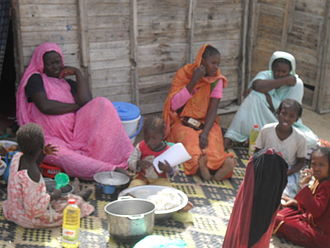Tragedy or Tradition?: Force-Feeding in Mauritania

Photo: qaz.wiki Creative Commons
October 8, 2021
Young girls in Mauritania, Africa, are aggressively force-fed a diet of up to 16,000 calories daily to ready them for marriage. This practice, obscured from authorities, is making an alarming resurgence in remote desert camps, denying girls any means of escape.
Beauty is an enigmatic paradigm throughout the world, and the West is no exception. From heroin-chic models to Kardashian-esque voluptuous bodies, both ends of the beauty spectrum are defined by their extremes. Male preferences have fabricated the constructs of beauty, and in the process of doing so, have thrust women into a rigid dichotomy of health and vanity. This warped dynamic is especially prevalent in rural Mauritania, where young girls swap their livelihoods for beauty in their pursuit of male approval through the practice of Leblouh.
Leblouh is a tradition in which young girls are forced to consume enormous quantities of food. Girls undergo Leblouh at five to fifteen years old to achieve a curvaceous and plump figure, which denotes affluence. Leblouh’s drastic fattening methods serve to prime young girls for early marriage, as their corpulence “matures” their appearance. Child brides start to look thirty instead of fifteen, and their obesity causes puberty to occur prematurely.
According to DBPedia, Leblouh originated from Tuareg beliefs that increased body mass is associated with great wealth and, therefore, became an important factor in a woman’s eligibility for marriage. Moreover, the wife of a rich man did less work than that of a poorer man as her servants catered to her every need and did all her chores. While destitute wives trekked through the desert emaciated and starved, the wives of rich men were superfluously fed and fattened. A wife’s stoutness was an emblem of her husband’s wealth, so the nomadic society of Mauritania venerated this particular size dynamic between women and men. Over the years, this belief morphed into a beauty ideal that is now central to a woman’s personhood in Mauritania.
Essentially, the bodies of Mauritanian women are used as symbols of wealth for men. “Part of the danger seems to be the moment you look at the human body as a resource for a commodity,” Mrs. Oppedisano, who teaches Humanities English, said. “In Mauritania, this sounds horrific, but we see it as just that kind of commodification of the body just taking a different form.” Leblouh strips a woman of her own agency and definition, and instead she possesses monetary value for someone else. Similar to how the fashion industry commodifies thin bodies as mere hangers for collections, Leblouh forces women to become fiscal accessories to their husbands.
Young girls from rural families are sent to “fattening farms” usually under the guise of being sent away for vacation or summer camp. According to Marie Claire, these camps are located in remote desert outposts without electricity or running water. Void of diversions and accessible escape routes, these settlements are ideal for the lengthy process of Leblouh. However, the reality is far more sinister and torturous. Older women who manage these “fattening farms” will administer tremendous proportions of food and utilize torture techniques to ensure girls consume all the food. Macerated dates with peanuts smothered in oil, numerous pints of thick goat’s milk, and pounded millet soaked in butter are just a few of the dense foods that the girls are forced to digest multiple times a day. If the girl refuses to eat or is unable to consume more food, the girls’ limbs are pinched between two sticks which are compressed to cause severe pain as punishment. Worse, if a girl throws up during the feeding process, she is forced to consume her own vomit.
The health risks associated with Leblouh are often extensive and irreparable. Heart disease, respiratory issues, high blood pressure, fertility problems, osteoarthritis, and a multitude of other conditions are known to follow as a result of the constant overconsumption. An inevitable outcome of Leblouh is obesity, which puts these young girls at risk for developing these crippling diseases as they get older. Moreover, pharmaceuticals, such as cheap hormones and steroids, are used as supplements to maintain a full figure in addition to Leblouh. Not only is this harmful, but it introduces other health issues.
However, some mothers contest that this practice is vital to improving the lives of their daughters. Since mariage designates women’s social status in Mauritania, most mothers view Leblouh as an essential safety net for their daughters. In poor villages, getting married early will ensure a comfortable and prosperous life for the young girls. And since Leblouh is the only option to achieve desirability, most young girls are confronted with social exile if they don’t gain weight.
The resurrection of this practice is disappointing to Mauritanian advocates and campaigners, who fought to diminish the toxic tradition of Leblouh. With the reappearance of the military factions in West Africa, the mission to curtail the presence of Leblouh has decelerated. Girls who reside in rural Mauritanian villages continue to practice Leblouh due to the lack of awareness and information surrounding its effects, and now campaigners who want to raise awareness have seen a recent uptick in the spread of Leblouh throughout Mauritania.
With the burdening Western ideals of thinness, the practice of force-fattening may seem empowering to women living with obesity, but some women refute that idea. “Anything that strips a woman of her right to control her body is not empowering in the slightest,” Aria Chawla (’22) said. As young girls are forced by society and their families to distort their body for male validation, the process of Leblouh weakens girls more than it bolsters their femininity and identity.
While it may seem impossible to do anything about a problem halfway across the world, one way to prevent further damage from Leblouh is to dismantle the ideology and stereotypes which constitute it. It might seem like a daunting task at first, but it can be accomplished through proper universal education about the consequences and effects that result from Leblouh. Most importantly, an emphasis on female empowerment is vital to combat the restrictive atmosphere that breeds these destructive traditions. Women need to possess bodily autonomy and the ability to make their own decisions regardless of societal influence. When women and society are no longer dependent on male validation, perhaps Leblouh will finally be an antiquated tradition.
















































































































































